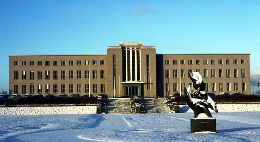|
| Education System in Iceland |
Primary Education
Iceland follows the Nordic education system, and accordingly divides the program into 4 phases. These are playschool, basic compulsory, upper secondary and higher. Most facilities are state owned. Basic compulsory education begins at age 6, and lasts for 10 years. Successful completion earns a Grunnskólapróf certificate following internal assessment by the institution concerned.
Secondary Education
Voluntary upper secondary education lasts 4 years, and offers 3 separate streams, provided by secondary comprehensive schools, industrial vocational schools, and specialized vocational schools that focus on specific trades.
Vocational Education
Lifelong adult education is available through independent institutions. Courses range from basic literacy training through to advanced computer skills.
Tertiary Education
 Icelanders refer to their tertiary education institutions as háskóli which literally means high school. There is no distinction between traditional universities and those that lack research facilities though. There are 8 such institutions of which the University of Iceland that opened in 1911 and is illustrated here is the oldest.
Icelanders refer to their tertiary education institutions as háskóli which literally means high school. There is no distinction between traditional universities and those that lack research facilities though. There are 8 such institutions of which the University of Iceland that opened in 1911 and is illustrated here is the oldest.
Although all its students were previously enrolled on the main campus, today it instructs students at any one of its 25 campuses, in the humanities, science and social science fields, as well as professions that include theology, law, business, medicine, pharmacology, dentistry, nursing, and engineering.
